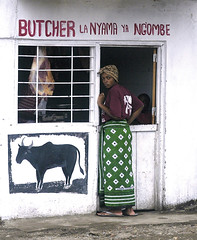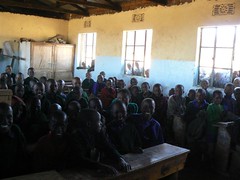Wheat, barley and rye orginated in the fertile crescent of Iraq and enabled humans to give up nomadic herding and establish agriculture-based villages – the basis of all civilised life. Tomatoes, corn, and potatoes are native to the Americas, and are now endemic to world cuisine – what would Italian cooking be without tomatoes?
But what has East Africa contributed to the world? Coffee, that ubiquitous drink that is now an $80billion global industry, originated here. A lot of people have become rich through coffee, Starbucks buys 11% of world production, but the small coffee producers of East Africa live in deep poverty.

Ninety-five percent of Tanzania’s coffee is grown by 400,000 small-scale farmers owning fewer than ten acres of land. Coffee is Tanzania’s largest export crop but small-scale farmers have not reaped the benefits because of policies that have restricted their direct access to the international coffee market.
USAID supports programs that allow better trading conditions for small producers in Tanzania.
The School of St Jude is located at the foot of Mt Meru in the prime coffee growing area of Tanzania. The School gives many poor families who depend on coffee production the chance for their children to get a good education.
Private philanthropy, like your donations to the School of St Jude, can help fill the gaps left by unfair trading systems, but the system continues to be unfair. So, it is good to see organisations working to change the system. One initiative to look out for is a new documentary film, called
Black Gold, that looks at coffee growing in Ethiopia. Made in 2006, it is doing the round of film festivals and should be released for general viewing later in 2007.
 Black Gold
Black Gold is an activist film that aims to point at unfair practices and to change them. Their
website has a forum that addresses issues of coffee production, Fair Trade, Starbucks and actions you can take.
If you live in the US, you can buy
Peets ’Tanzania Kilimanjaro’ – the 840 growers that supply it get 50% above market rates for their quality beans.
In Australia, Oxfam sells a Fair Trade coffee that is sourced partly from Tanzania – my Christmas supply is nearly finished. Time for more!
On the basis that I need to help at two levels – filling gaps in the system (through support of St Judes) AND changing the system — I am on a letter writing campaign. I am writing to all 150 members of the House of Representatives to ask them to raise the level of Foreign Aid that Australia gives and to target it at extreme poverty. Currently, Australia gives only .26% of GDP as foreign aid, placing it fourth-last of OECD countries. It has committed to increasing this to 0.5% by 2010 and 0.7% by 2015 and these amounts will be needed if the Millenium Development Goals are to be met, because it looks like they won't be at this rate.
I have drafted the letter, printed copies and bought the envelopes and stamps. Folding and stuffing 20 envelopes a day is quite soothing! Especially when we lose the cricket, as we did last night — ending Australia’s perfect summer.
There is an interesting update about the film and related issues on the
Poverty News blog. 15 Feb 2007.





































